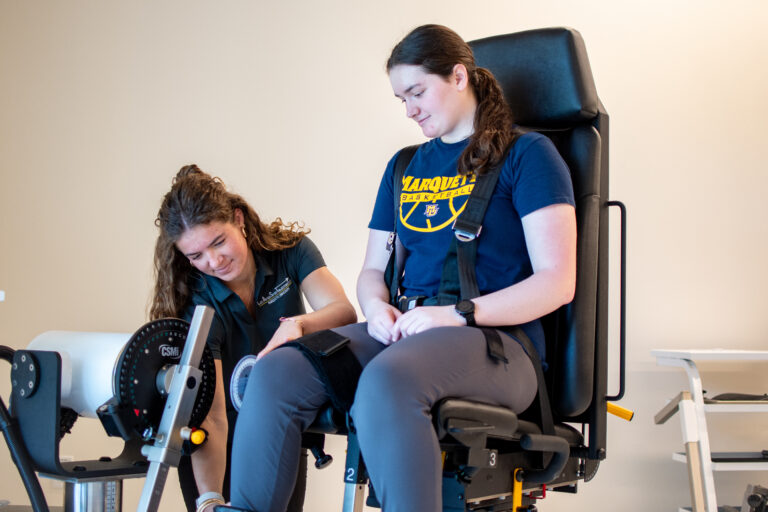Dr. Alex Milovic found an unlikely on-ramp to studying envy: baseball.
“I was asked at my Marquette job interview why I researched envy, and I told them I was a Mets fan, so it came honestly,” Milovic quipped.
After getting his own thorough education in envy, Milovic now spreads the word about its potential dangers as an associate professor of practice in marketing and the associate director of the Center for Professional Selling in the College of Business Administration. In 2014, Milovic published his Ph.D. dissertation, titled “If You Have It, I Want It…Now! The Effect of Envy and Construal Level on Increased Purchase Intentions,” which explores the ways that coveting others’ lifestyles influences people’s likelihood to buy products.
Nearly a decade later, students live in a media environment that offers exponentially more opportunities for negative, self-defeating comparisons. Milovic worries about the impact it’s going to have on young people’s decision-making.
“People in the future will look to us and social media like the way we look back at past generations and say, ‘You let kids smoke and drink that early?’” Milovic says. “But the genie is out of the lamp. You can’t rein it in, so it must be about educating people about what’s real and what’s fake.”
The phenomenon of envy-driven purchasing is nothing new: people have bought things out of jealousy toward their neighbors since the beginning of commerce, and the phenomenon evolved through each new iteration of mass media. However, students today must deal with something that no generation before them ever had at a comparable age: targeted, algorithm driven advertisements with sophisticated knowledge of a person’s tastes and potential sources of influence.
“These algorithms are built to speak to those insecurities that we all have,” says Dr. Jessica Ogilvie, the Brennan Chair in Marketing and the director of the Center for Professional Selling. “We’re in an unfortunate world where you are constantly comparing yourselves to others and you’re much more of a target for these aspirational purchases.”
Growth of online influencer culture has only exacerbated this trend, to the point where it has impacted the next generation’s professional ambitions. Global affiliate marketing firm Awin recently conducted a poll of more than 2,000 parents with at least one child between the ages of 11 and 16, asking them what kind of careers their children expressed interest toward. “Social media influencer” ranked second on the list and “YouTuber” ranked third, both trailing only “doctor” for the most popular choice. The aspirational view of profit-driven influencers could make young adults more susceptible to their advertising.
Envy purchases are not only a young person’s problem, Milovic says. Those who are older and have more disposable income will often replicate the same behaviors with more expensive purchases, such as a bigger house or a newer car.
“People will make mistakes,” Milovic says. “Whenever I say this, I’m telling myself as much as I’m telling the students. You might make some mistakes and they might be expensive mistakes, but there’s a lesson there. People learn the most when they lose money in the process.”
Ogilvie focuses more on the selling side of this relationship, where the lines between smart and unethical can be blurry.
“We all have an ideal self, and there are products that make us feel like we’re going to be living a life closer to that image,” Ogilvie says. “What we always teach our sales students is that they’re trying to help the customer picture how this thing you’re selling is going to solve a problem for them now.”
“The other thing I tell my students is to work for a company or sell a product that you genuinely believe in. I work at Marquette because I believe that it makes a difference in a student’s life that sets them up for a higher standard of living. If you believe in something to that degree, it’s a lot easier to be ethical,” she adds.
When evaluating whether a discretionary purchase is going to be a cause of regret later, it’s useful to use the dichotomy of intrinsic versus extrinsic. Is the purchase being made because it brings you authentic joy (intrinsic), or is it because you think it will satisfy others’ expectations (extrinsic)? While this is far from the only criteria one should consider when buying an item, going through this mental calculus can save money by reducing wasteful purchases.
One of the best ways to land more on the intrinsic side of that equation is to avoid impulse purchasing at all costs.
“If you feel like you’re going to make a purchase decision that you haven’t thought all the way through, taking that pause, whether it’s stepping away from social media for a while or saving that post to make sure you want to purchase it the next morning, that will tell you everything you need to know about whether it’s a good decision or not,” Ogilvie says.
“Companies are always going to make the ‘buy now and save’ or ‘buy now and it won’t be available later’ case,” Milovic says. “If you buy more quickly, you will usually buy more irrationally as opposed to considering whether the item will actually make your life better.”
More than 7,000 undergraduate students are enrolled at Marquette. Many of them will experience the first hallmarks of financial freedom when they come to campus, including their first bank account, paycheck and credit card. Advertisers, marketers and sales professionals know this, just as surely as they know that the brand loyalty created in young adulthood can result in a lifetime of purchases. Knowing how to recognize their tactics can save you money and make you a smarter customer.



